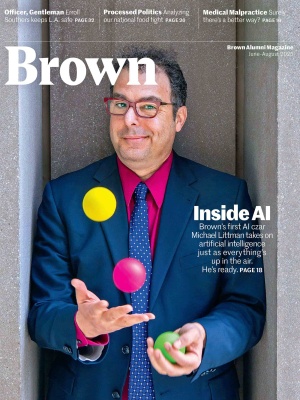In her 2018 memoir, Make Trouble: Standing Up, Speaking Out, and Finding the Courage to Lead, Cecile Richards ’80 described arriving on College Hill feeling like a Texas misfit, finding passion and purpose on the picket lines alongside Brown’s striking janitors and librarians, and then setting out after graduation to help whoever needed to be helped and right whatever wrongs she encountered.
But Richards’s activist path, which led her to a high-profile role as of president of Planned Parenthood Federation of America from 2006 to 2018, actually began in the Lone Star state, spurred on by progressive parents, a law professor father, and a mother who would raise a family, enter politics, and become an iconic governor.
From those days until her death at 67 in January, 18 months after she was diagnosed with glioblastoma, a form of brain cancer, Richards fought the good fight, not only for reproductive rights but for all sorts of causes that she viewed as interconnected.
“The same folks I organized in hotels in New Orleans, or janitors in Los Angeles, or nursing-home workers in East Texas, they’re the folks that rely on Planned Parenthood, too,” Richards told a packed crowd at a Nashville book event in 2018. “People come to us for reproductive health care, but they need a lot of other things. They need a living wage. They need child care that’s affordable. If they’re immigrants, they need us to stand with them.”
Her first stop after college was New Orleans, where she organized hotel workers alongside future husband Kirk Adams; the couple had three children and one grandchild.
Richards went on to work on labor campaigns, run a progressive nonprofit, and serve as a top aide to then-minority whip Nancy Pelosi. She frequently returned to Texas, helping mother Ann Richards’s gubernatorial campaigns, and also fought the conservative takeover Texas school boards.
She brought the same fight to her personal life. At a February memorial, her daughter Hannah Adams told of the time Richards realized her son’s Boy Scout troop was camping and learning how to make fire from flint, while Hannah’s Girl Scout troop was just selling cookies. Richards pulled Hannah out and started an alternative group for girls: Future Woman Presidents.
“We visited and volunteered at a local domestic violence shelter. We went to the White House and took turns practicing speeches in the press briefing room. We met with congresswomen and of course, we went camping a lot,” Adams said. “This was just one of the many ways Mom set out to remake the world for my brother, my sister and me, and that was how she operated when she saw an injustice.”
When Planned Parenthood approached Richards with the president’s job, she saw it as a logical career next step. But she also admitted that she at first felt intimidated by the role that would make her an icon in her own right. It was Ann Richards who helped snap her out of it.
“She said ‘Cecile, get over yourself. This is the only life you have. You will regret it forever if you don’t try,’” Richards recalled.
Richards’s tenure at the organization was marked by growth as well as by difficult political challenges.
Planned Parenthood played a major role in passing the Affordable Care Act and ensuring that it would cover birth control at no cost to patients. Richards launched an overhaul of Planned Parenthood’s website into a reliable resource not just on birth control but on sexual consent, sexually transmitted diseases, and gender identity. She pushed to bring young people whose peers needed these resources on board.
There were also contro-versies, from the temporary severing of a longstanding relationship with the Susan G. Komen breast cancer advocacy foundation (among the services Planned Parenthood offers is breast exams) to the release of a heavily edited video purporting to show that Planned Parent-hood sold fetal tissue from abortions. Both grew out of attacks by an increasingly empowered anti-abortion movement. And that was before Donald Trump set in motion the eventual overturning of Roe v. Wade.
Richards had moved on from Planned Parenthood by the time the U.S. Supreme Court revoked the 50-year-old right to an abortion, and conservative states quickly moved to ban the practice.
But, even after a cancer diagnosis, she looked for ways to fight back. She launched an online tool to help women figure out how to access care and started Abortion in America, a storytelling project out of Louisiana, which has one of the nation’s most restrictive bans, highlighting the experiences of people who’ve struggled to get health care under the new reality. The work will go on, her co-author and longtime associate Lauren Collins Peterson said, and will expand to more states.
While she understood just how hard things are right now, Peterson said, Richards “really never lost her faith that ultimately the right of every person to make their own decisions about their body and their future would prevail.”
“The thing that was really giving her hope was the people coming forward to share their stories,” which Richards believed could change public perceptions and even bridge political divides, Peterson said.
Richards’s own story earned her some heady accolades. In 2010, Brown awarded her an honorary degree alongside Nelson Mandela (in absentia) —a full circle moment three decades after she missed her own graduation to protest the University’s investment in apartheid South Africa.
And this past November, Joe Biden awarded her the Presidential Medal of Freedom.
At her memorial, her husband recounted a question she’d often posed, including at last year’s Democratic National Convention: What would you say to future generations who ask, “When there is so much as stake for our country, what did you do?” Her response, Kirk Adams said, was always “everything I can.”
But he also added a grace note: “Her life was the answer.”






